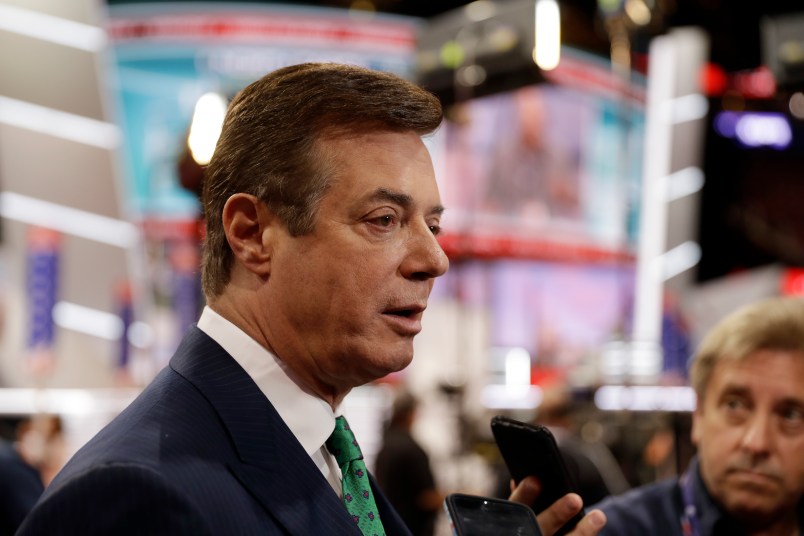ALEXANDRIA, VIRGINIA — The federal judge presiding over the criminal case against Paul Manafort in the Eastern District of Virginia on Friday quizzed the attorneys representing special counsel Robert Mueller on how the charges they brought against Manafort were linked to their core investigation into Russian election interference and any potential collusion with members of the Trump campaign.
“I don’t see what relation this indictment has” to the special counsel’s authority, Ellis told prosecutors.
U.S. District Judge T.S. Ellis asked several pointed questions to prosecutors during the Friday morning hearing on Manafort’s motion to dismiss the federal grand jury indictment, and he spent more time pushing the prosecution to parse out their reasoning than he did pushing Manafort’s attorney, Kevin Downing, to do so.
At the beginning of the hearing, Ellis noted that the Justice Department was aware of some of Manafort’s activities in Ukraine that led to the charges in the Virginia indictment before Mueller was appointed and pointed out several times that the charges against Manafort were not related to Russian election interference.
“That seems to me to be obvious,” Ellis said of his belief that the indictment against Manafort is unrelated to Russian election interference.
Ellis also hypothesized several times that Mueller’s team brought charges against Manafort and his deputy Rick Gates in order to push them to turn over information on the Trump campaign. The lawyer arguing for Mueller’s team, Michael Dreeben, would not say that Ellis’ hypothesis was correct, but he did admit that Mueller’s team received some kind of information from the Justice Department on Manafort when Mueller took over the Russia probe.
Ellis told the prosecutors that it seemed they were using the Manafort indictment “to exert leverage on a defendant” so that they will flip and provide information on the core issues of the investigation. He said that the indictment is about pressure and argued that Mueller team is trying to make Manafort “sing.” The judge told prosecutors that they “don’t really care” about Manafort and the charges they brought against him.
Though Ellis appeared to go tougher on prosecutors, he acknowledged that Deputy Attorney General Rod Rosenstein did spell out Mueller’s authority to investigate Manafort’s Ukraine work in a memo issued on Aug. 2, 2017, more than two months after the initial order appointing Mueller. The memo made public by Mueller’s team in its response to Manafort’s push to dismiss the indictments against him is heavily redacted, only revealing details related to Manafort.
Ellis asked prosecutors to submit the full unredacted memo to the court under seal so that he could determine whether the parts made public by Mueller’s team were indeed the only portions relevant to Manafort.
Manafort is seeking dismissal of the indictment brought against him in Virginia, arguing that Mueller did not have the authority to bring the charges against him. In the motion to dismiss, Manafort’s attorney made a two-part argument pushing for dismissal. They argued that Rosenstein did not have the power to give Mueller the broad authority to investigate “any matters that arose or may arise directly from the investigation.” They also argued that even if Rosenstein did have that authority, Mueller overstepped the investigation’s parameters by bringing charges stemming from activities the Justice Department was aware of before Mueller was appointed.
Also at issue is the gap between Rosenstein’s initial order in May 2017 appointing Mueller and the Aug. 2 memo detailing the boundaries of the investigation. In between the May and August documentation, the FBI raided Manafort’s home.
During the hearing, Ellis also quizzed the prosecutors on why they referred some investigative material to the Southern District of New York, an apparent reference to the probe into Trump lawyer Michael Cohen, but did not refer the Manafort investigation to U.S. attorneys in the Eastern District of Virginia.
“I don’t see the difference,” Ellis said.
Dreeben, the lawyer arguing for Mueller’s team, responded that the Manafort indictment falls within the Russia investigation because he was an official in the Trump campaign and had connections to Ukraine.
Ellis also asked Downing why he was not simply seeking to transfer the case from the special counsel’s office to the regular federal prosecutors in the Eastern District of Virginia. In response, Downing said he was also arguing in the motion to dismiss that Mueller did not have the authority to take some of the investigative steps he had taken against Manafort in the case, including obtaining subpoenas.
During a back and forth with prosecutors on Mueller’s investigative authority, Ellis told Dreeben, “We don’t want anyone with unfettered power.”
“We are not operating with unfettered power,” Dreeben told Ellis, noting that the Mueller investigation is accountable to Rosenstein and that Rosenstein laid out their authority to investigate Manafort in the Aug. 2 memo.







Hmmmm. Why does it matter to the judge?
The matter before the court are the charges in the docket.
Something smells.
Oh, Jesus.
And yeah, before anyone asks, senior status Reagan appointee.
What can the judge do?
Oh, nothing really important. He only has the power to dismiss the case on the grounds that it’s outside Mueller’s mandate.
I thought Rosenstein got to decide what falls under Mueller’s mandate.